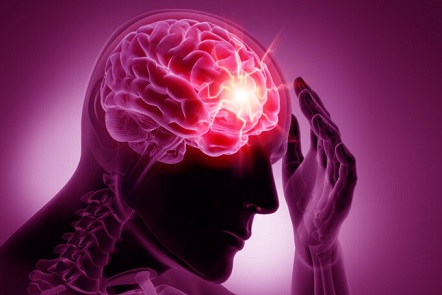Study links COVID-19 lung infection to brain inflammation without direct viral presence
Nikhil Prasad Fact checked by:Thailand Medical News Team Oct 15, 2024 6 months, 1 week, 4 days, 19 hours, 56 minutes ago
Medical News: Researchers have uncovered a link between COVID-19 infections in the lungs and inflammation in the brain, even when the virus itself isn't detected in brain tissue. This discovery opens up new understandings of how the virus affects different organs, which could explain the neurological issues that many patients with COVID-19 experience, such as confusion, memory problems, and brain fog.
 Study links COVID-19 lung infection to brain inflammation without direct viral presence
Study links COVID-19 lung infection to brain inflammation without direct viral presence
The research, conducted by teams from the University of Liverpool-UK, University of Cambridge-UK, and King’s College London-UK, provides insights into how lung infections can trigger immune responses in the brain. This
Medical News report will explore the findings and their potential implications for future treatments of COVID-19-related neurological symptoms.
The Study’s Objective: Understanding Brain Inflammation
Although COVID-19 has been primarily considered a respiratory illness, it is now known that it can affect other organs, including the brain. Many patients who recover from COVID-19 report neurological symptoms, even when no viral presence is found in their brains. Researchers have been working to understand this phenomenon and the study in question focused on how immune responses triggered by lung infections can extend to the brain.
To model this, the scientists used mice that had been infected with a low dose of the SARS-CoV-2 virus in their lungs. This low-inoculum approach was designed to replicate human cases where the virus is mostly contained to the lungs but still results in neurological complications.
What Happens in the Lungs Doesn’t Stay in the Lungs
The mice used in the study showed significant viral activity in their lungs but none in their brains. However, the researchers discovered that this lung infection led to a strong immune response in the brain. Chemicals that are typically associated with brain inflammation, such as CCL4, IFNg, and IL-17A, were elevated in the brains of the infected mice. Additionally, the brain’s microglial cells, which act as immune cells in the brain, became more reactive.
This process, where the immune system gets activated in one part of the body and causes inflammation in another, is known as “para-infectious immune activation.” The study provides evidence that this immune activation is responsible for the neurological complications seen in COVID-19 patients, even when the virus doesn’t directly invade the brain.
How the Brain’s Immune Cells React to COVID-19 Lung Infections
In the study, researchers found that even though there was no active viral replication in the brain, the immune cells in the brain were reacting as if there was an infection. The microglial cells in the brains of the infected mice showed signs of reactivation, meaning they were in a heightened state of alert, responding to a perceived threat.
In n
ormal conditions, these microglial cells help keep the brain healthy by cleaning up damaged neurons and maintaining brain function. However, when they become too active, they can start attacking healthy cells, leading to inflammation and potentially contributing to the neurological symptoms seen in COVID-19 patients.
The Role of Cytokines in Brain Inflammation
Cytokines are small proteins released by cells that have a significant role in regulating immune responses. In COVID-19, cytokine storms - where the body releases too many cytokines too quickly - have been linked to severe outcomes.
This study shows that even in cases where the virus does not reach the brain, cytokines like CCL4, IFNg, and IL-17A can still cause brain inflammation.
In the mice studied, the researchers measured increased levels of these cytokines in the brain, despite no signs of direct viral infection in the brain tissue itself. This suggests that the immune response in the lungs is strong enough to trigger brain inflammation indirectly.
Implications for Long COVID and Brain Fog
The findings of this study could help explain why so many people with COVID-19 experience neurological symptoms, even if they had only mild respiratory symptoms. Brain fog, memory loss, confusion, and even more severe neurological conditions like encephalitis have been reported in COVID-19 survivors, but in many cases, no virus is detected in the brain.
The indirect immune activation described in this study offers a possible explanation: the immune system’s response to the lung infection might be what causes these brain issues, rather than the virus directly infecting the brain.
Understanding this pathway could help doctors develop new treatments for these neurological symptoms. If it is the immune response causing the damage, then treatments that target inflammation might help reduce brain-related symptoms in COVID-19 patients.
Potential Treatments and Future Research
The researchers behind this study are hopeful that their findings will open the door to new treatments for COVID-19-related brain inflammation. Currently, treatments like corticosteroids and anti-inflammatory drugs are used to manage COVID-19 symptoms, but this study suggests that more targeted treatments could be developed to specifically address brain inflammation.
Future research will likely focus on identifying the exact pathways by which lung infections cause immune activation in the brain. Additionally, scientists may explore whether similar processes occur in other viral infections that are known to cause neurological symptoms, such as the flu.
Conclusion: A Step Forward in Understanding COVID-19’s Impact on the Brain
The study provides valuable insights into how COVID-19 can affect the brain without direct viral invasion. It suggests that the immune system’s response to a lung infection can lead to brain inflammation, potentially explaining the neurological symptoms seen in many COVID-19 patients. As scientists continue to explore the links between COVID-19 and the brain, these findings could lead to new treatments for the long-term neurological effects of the virus.
The study findings were published in the peer-reviewed journal: Frontiers in Immunology.
https://www.frontiersin.org/journals/immunology/articles/10.3389/fimmu.2024.1440324/full
For the latest COVID-19 News, keep on logging to Thailand
Medical News.
Read Also:
https://www.thailandmedical.news/news/german-and-swiss-study-finds-that-sars-cov-2-leaves-an-innate-immune-scar-on-the-brains-of-the-infected
https://www.thailandmedical.news/news/unusually-late-onset-of-rare-brain-disease-after-covid-19
